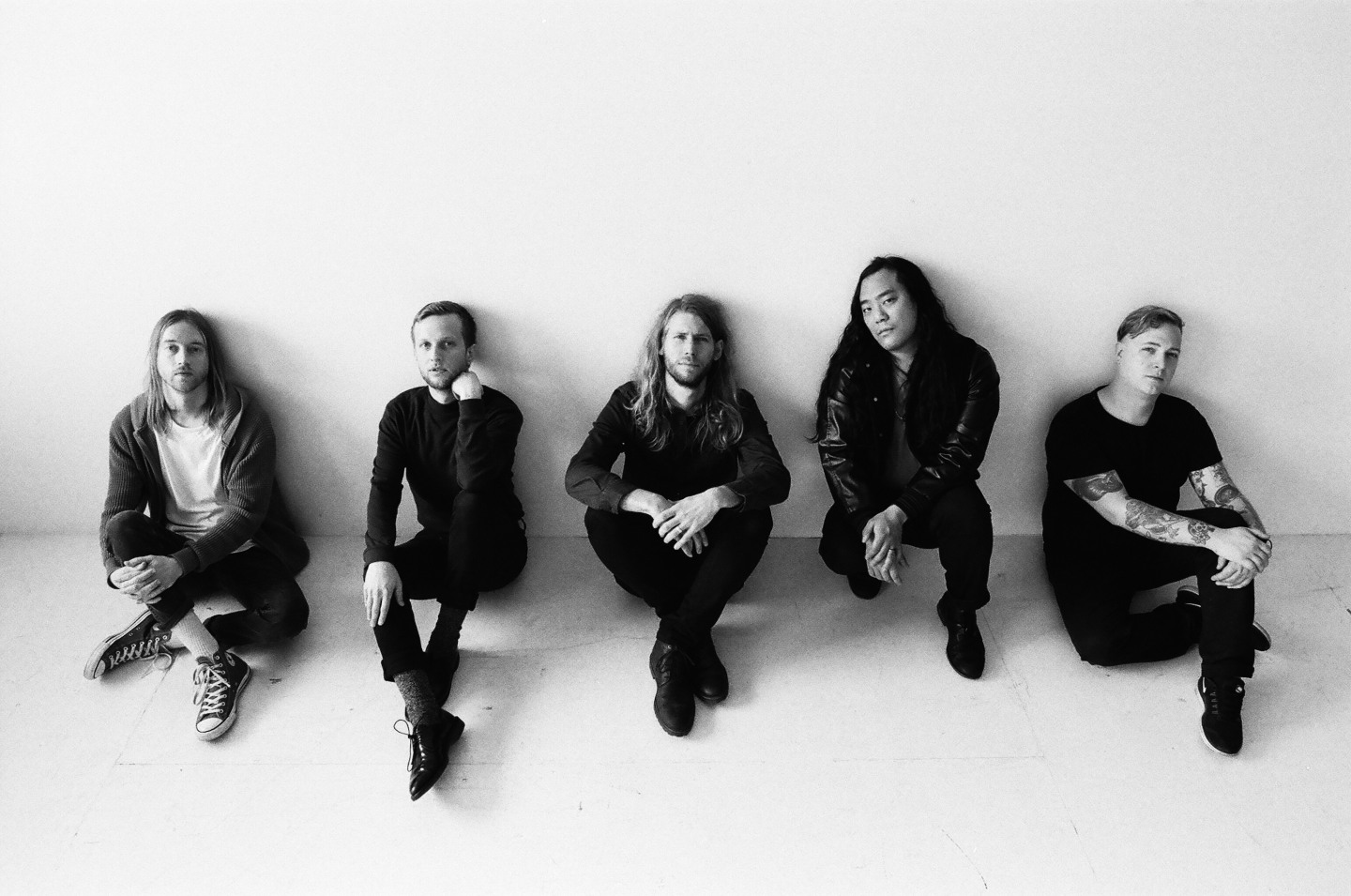
A Möbius strip of love connects La Dispute and their uniquely fervent fanbase. Tattoos of the post-hardcore band’s logo — a blossoming flower with almost divine proportions — are posted proudly on the La Dispute subReddit. On YouTube, you’ll find dozens of concert videos with fans shouting frontman Jordan Dreyer’s lyrics, moving in a manner beyond the blind catharsis of a mosh pit. It’s pop idol-level fervor for arty, loud guitar music — energy that La Dispute never fails to cast. “It feels very transactional,” Dreyer says over the phone. “That's always been super important to the five of us.”
Formed in Grand Rapids, Michigan in 2004, La Dispute is ringing in its fifteenth year with a new album, Panorama, released today on Epitaph. The group has a reputation for restlessly exploring genre; sometimes, their left-turns are particularly pronounced, as it was with the electronic instrumental soundscapes for the 2016 soundtrack to the fan-made band documentary Tiny Dots and their spoken word EP series Hear, Hear. Panorama is a constellation of Slint-esque spaciousness and bulldozing, yearning guitar noise. As usual, Dreyer cuts a distinct figure; his vocal style alternates between apocalyptic and wounded, but his lifelong passion for literature and writing makes for stories that contain full worlds in just a few sentences.
Panorama was created at a time of upheaval for Dreyer. He began writing for the album as he and his partner were preparing to move from Grand Rapids to Seattle. “I think [the album] took on an added importance this time around because of that change,” he says. Their daily lives required frequent trips between Grand Rapids and Lowell, the Michigan town Dreyer’s partner is from. As they drove back and forth, she told him stories about people who lived and tragically died there; out of those biographical details, Dreyer drafted lyrics.
La Dispute reunited from places as far-flung as Australia last year to write and record a new album in three months; two months and one finished album later, they scrapped everything and started over. Dreyer is blunt when describing the mood of the sessions: “There was an undercurrent of anxiety about the future of our band. It felt like we didn’t know how to do it anymore.” During our conversation, Dreyer revealed how the band handled it all in what he refers to as “one of the more satisfying creative experiences of our lives.”
Tell me about the scrapped album and your decision to go back to the drawing board for Panorama.
We spent so much time off that it was difficult to find our footing again. Part of it was the lack of direction, to be perfectly frank. When we did Rooms Of The House, we had a very deliberate intent, and it was in some ways a reaction to the record we'd done previously. We're all still happy with that record, [and] when we went to start this one, we were still stuck in that mindset. It took two months to collectively realize that we weren’t excited about what we were doing. The songs were fine. If I went back and listen to them now, I'd probably like them more. [But] it wasn't the right thing for us to be writing.
We spoke very openly and honestly about how we all felt, and why it didn't feel like it used to. We decided to start everything over. [We were] driven by a sense of urgency with one month left before one of our bandmates moved back to Australia. From that moment, we were excited about it. Everything happened very organically and instinctually. We stopped writing in separate rooms. I like to take credit for us feeling excited about our band again, because I had to run an errand and they wrote “Street One” while I was gone. We found our place from there. We always felt it was important to introduce different restrictions to change the end product — to not stagnate. This time around, we stalled for two months, and that ended up making the record what it was. We just threw shit against the wall and saw what stuck.
Was the departure of founding guitarist Kevin Whittemore an obstacle?
I don't think so. What led Kevin to make the decision to leave is that the four of us, had been moving in a particular sonic direction for years. Kevin was moving in a different direction — a different timeline than us, creatively. The biggest thing to overcome was that he's one of our best friends. It changes the dynamic of your every day — not just musically, but personally too.
Tell me about the drives with your partner between Grand Rapids and Lowell, and how they inspired the album.
I started to make that drive fairly consistently after we finished our previous records. It's always how it works — I'll have a handful of ideas, stories, or a general conceptual structure that incubates over time. A lot of it is absorption of environment and stories. Sharing a life with somebody and hearing stories from her youth, her community, and her neighborhood, it's a lot easier to see how those things had an impact on another person and the people around them.
The thing that I’ve always loved about my favorite writers, books, stories, and poems is pure aesthetic
What was your process for taking these stories and then translating it into songs? Were you mindful of being respectful?
Since we started the band, I’ve spent a decent amount of time since writing about other peoples' experiences. A lot of these stories aren't necessarily mine to tell, so it's important to be very cautious and respectful — to try to play the role of the observer, dictate events as they've happened to the best of my knowledge, and allow people to make their mind up about how that fits into a broader context.
This time, it was a bit difficult because it's been a while since I've written from a more personal perspective. The characters in this record are more directly connected to me and made me hyper-aware of every word. It wasn’t an easy process, and I took for granted how difficult it can be. It took me a while to finish. We had to keep pushing back our release date. I was editing and editing, and at a certain point you disconnect from what you're talking about.
How do you know when you’ve edited too much?
When I can't get it done, I have a pretty strong sense of why. The thing that I've always loved about my favorite writers, books, stories, and poems is pure aesthetic — the arrangement of words on a page. That's still my primary thrill absorbing art, but also making it. When it clicks and you know that's the right way to arrange something, it resonates.
If you spend too much time trying to make it word-perfect, you lose sight of making it feel organic and true to your own experience or the people you're writing about. At a certain point, I had to just let myself write more abstractly than I have in the past. If I didn't allow myself to try to capture a tone, I was never going to finish.
I have a theory that the reason your lyrics are so poured over by fans is because of your literary background, which enables you to put yourself as this omniscient narrator better than most other lyricists can. Even when you're singing in the first person, the listener can feel more like you're talking about them.
I think you're right. So many people talk to me about how one thing or another that we’ve done has connected with them. Some of those people I share very little life experience with. I've always felt hesitant to say anything definitively because I'm figuring it out like anyone else. There's a certain mindfulness that, if I'm to write about anything, I have to be an omniscient narrator, talk about it as objectively as I possibly can, and let people draw whatever conclusions they like. Writing from that perspective gives people the opportunity to fill in some of the blanks themselves.
The way that you talk about your role in the band reminds me of imposter syndrome. Is that something you deal with?
Oh yeah. I feel that way during this interview, being totally truthful. It took me 10 years of making music to feel comfortable calling myself a musician. I suspect it'll be longer before I call myself a writer. It's just really hard sometimes to find a way to self-affirm talent. Even saying the word talent makes me feel uncomfortable. I think the reason I'm able to feel comfortable talking and performing, and writing is that it's so much fun. I had fun having this conversation. You've got to take yourself a little less seriously. Just enjoy learning things while having conversations. Enjoy having fun performing music, and enjoy taking my best stab at the creation of art for the enjoyment of anyone who might even in the least bit interested.
This interview has been edited and condensed for clarity
